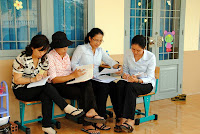“On behalf of our teachers participating, we would like to say thank you very much for offering us this wonderful opportunity to help our teachers continue to develop their skills and knowledge in working with hearing impaired children……”
And so began an email I recently received from Vietnam about a new video analysis program we started last month to help select teachers enrolled in our Vietnam Deaf Education Program further their professional development. The idea was born out of last summer’s training results. It was evident that the Vietnamese teachers benefitted greatly from our training program’s format of intensive classroom and therapy sessions with young children with hearing loss. They learned a great deal from our Global Foundation professionals who guided the teachers through the process of assessment and lesson planning. Our team provided feedback on teaching techniques and strategies as the teachers were carrying them out with the children. We decided to incorporate video review sessions during the school year to continue that model of coaching.
It was certainly an interesting and rewarding experience putting this plan of video analysis into action. Select teachers were invited to take part in this program and were assigned to some of our Global Foundation professionals who volunteered their time and expertise. A group of enthusiastic Vietnamese students studying English at a university in Ho Chi Minh City offered to serve as the communications conduit between all of us.
After designing the process, I sent out a detailed email to the Vietnamese outlining the long list of steps involved from start to finish. I figured it would be useful to have all that information in one place. The response? A gentle and polite email that read….”Dear Paige, what is the first step?”
Yeah. I was reminded yet again about the importance of slowing things down when working across communication and language divides.
To add to the challenge, a few of the Vietnamese did not use email regularly. When we did not hear from them, a phone call was required to ask them to check online for details. One used her husband’s email account and he inadvertly deleted all of our messages not knowing who they were from. Others had to learn quickly how to capture and upload video. And of course, the directions on the upload sites were in English making that more complicated for them than it would have been otherwise.
But you know what? Everyone stuck it out with humor and grace and worked together to help each other figure out how to implement this process in the best fashion. The interpreters played a huge role in it all, and I am grateful to them for their patience and time. 
The Vietnamese submitted videos of themselves working with their children in therapy or classroom sessions. They completed self-evaluation forms and submitted the forms along with their lesson plans and the videos. The interpreters transcribed the videos and the forms into English. Our team then provided pages of comments and suggestions to the Vietnamese. This feedback was then translated back into Vietnamese and shared with the Vietnamese teachers.
What was amazing is that all of this was accomplished in just six weeks —from setting up the process and capturing video to the day the final feedback form was translated and sent off to the Vietnamese teacher. Speaks volumes about their tenacity and desire to learn.
At one of the schools, the teachers in the video analysis program shared their videos and feedback with other teachers at their center during a team meeting. They watched the videos together and learned from each other. The Vietnamese shared with me that they gained from the analysis, comments, and suggestions from our professional team about such things as how to encourage the parents to engage in therapy, be aware of surrounding sounds that would affect a child’s listening ability, how to position questions and phrases with young children so they learn to listen and use new words, how to expand vocabulary, tips on reading aloud to children, among other things.
One commented, “I think that the ideas and suggestions are really useful for our teachers because they help them know what was effective and well done or what needs to improve so that their work will become more efficient and successful, and the kids can learn better in the future…”
Another wrote in her thank you note, “I receive your feedback with so many many thanks. They are very helpful especially during this important period of language….”
And, so, during this Thanksgiving week, one of the things I am thankful for is the power of technology and the Internet to make our world smaller, to provide tools to help each other learn and grow. The teachers all enjoyed this experience and I look forward to going through this process with them again in February 2013.
